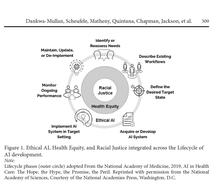
Abstract
The COVID-19 pandemic has created multiple opportunities to deploy artificial intelligence (AI)-driven tools and applied interventions to understand, mitigate, and manage the pandemic and its consequences. The disproportionate impact of COVID-19 on racial-ethnic and socially disadvantaged populations underscores the need to anticipate and address social inequalities and health disparities in AI development and application. Before the pandemic, there was growing optimism about AI's role in addressing inequities and enhancing personalized care. Unfortunately, ethical and social issues that are encountered in scaling, developing, and applying advanced technologies in healthcare settings have intensified during the rapidly evolving public health crisis. Critical voices concerned with the 'disruptive' potentials and risk for 'engineered inequities' have called for reexamining ethical guidelines in the development and application of AI. This paper proposes a framework to incorporate ethical AI principles into the development process in ways that intentionally promote racial health equity and social justice. Without centering on equity, justice and ethical AI, these tools may exacerbate structural inequities that can lead to disparate health outcomes.
